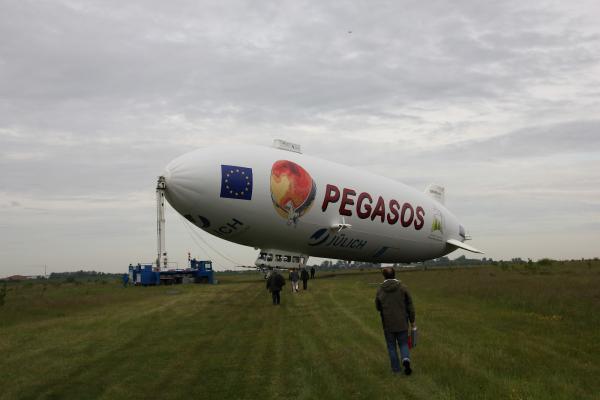Their mission is to collect as much data as possible on air pollutants – such as particulate matter and ozone – and climate-altering gases – including CO₂ – in the atmosphere. Their purpose: to help Europe find the best way to tackle both problems.Clean air is essential for our health and the environment yet, by activities such as burning fossil fuels and driving cars, we jeopardise its quality. These same activities also cause global temperatures to rise; we risk reaching a tipping point, beyond which climate change would be irrevocable.But while scientists are sure of this, they need more data to determine how air pollutants and climate change agents are affecting the atmosphere and how changes in the levels of all of these components have an impact on our complex eco-system.A ‘delicious’ layer cakeThe team on Pegasos (Pan-European-Gas-Aerosol-Climate Interaction Study) has been working around the clock, hence the night flights, to gather information on the concentration of different pollutants and gases in the lowest region of the earth’s atmosphere in different parts of Europe.Scientist and crew member, Dr Glenn Wolfe, who likens the atmosphere to a ‘delicious cake’ made up of many layers, explains that it is here – in the planetary boundary layer – where emissions have the most immediate impact on humans.In 2012 the climate zeppelin undertook several missions in Europe’s skies © PEGASOSIn 2012 the climate zeppelin undertook several missions in Europe’s skies © PegasosThe early starts may be tough, he says, but it is important to examine the change in concentrations of pollutants and climate agents throughout the day, since the sun influences the height of this planetary boundary layer and drives the production of pollutants such as ozone and particulate matter.And that is also where the Zeppelin comes in. Unlike an aeroplane, it can fly for long periods at low altitudes and at low speeds, allowing the crew to examine this lower layer, giving it time to take the necessary measurements and thus making Pegasos the first study project of its kind.Project coordinator, Professor Spyros Pandis, says that previously it has been very difficult to measure these changes. ‘There were a lot of measurements at ground level and many projects by aeroplane. We realised there was a gap in our measurements.’’This needs to be done right’Core to the EU-funded Pegasos project is that it examines both air pollutants and climate change gases at this level, examining how they interact and determining the effect a change in a single component has on the system as a whole.The aim of Pegasos is to provide better estimates of air pollution and its impact on the climate across Europe. Collecting data on a pan-European scale is essential to give a fuller picture. Air pollutants produced in one EU Member State can of course have an effect beyond national boundaries.By providing this data, Pegasos will support the EU in the development of its air quality policy. It will also help towards better quantifying regional and global links between air pollution and climate change.Understanding the link between air pollution and climate change is crucial, explains Prof. Pandis, adding that policy makers will have to tackle these environmental challenges together if they are to be effective. ‘By dealing with one problem, we could otherwise end up making the other one worse. This needs to be done right.’He gives the example of wood burning. ‘Everyone thinks that this creates less CO₂ and that’s right, but one can create enormous levels of particulate matter and hence air pollution. The two problems often start from the same source, so there are opportunities to deal with them together.’‘Our central hypothesis is that we can do a lot better if we treat them together,’ says Prof. Pandis. ‘Our hope for the very end of this project will be to give advice and insight about the things that need to be done in Europe to deal with both problems.’The Pegasos Zeppelin, which made its first operational flights in May 2012, will gather data from across Europe. So far, it has made flights in the Netherlands, Germany, Italy and France. This year, its destination is Finland.
This article was originally published in Horizon, the EU Research and Innovation magazine.
Add to favorites:
Share:
Listing Description
Video
Documents
No documents available.
Ask KETMarket to make a contact
Connect with the Listing Owner!
💬 Please log in now to askKETMarket to make a contact. Not a member yet? Sign up for free and start connecting today!
Video
Related Funding and Finance Opportunities
Unlock Exclusive Funding Opportunities!
🔑 Get instant access to tailored funding opportunities that perfectly match your needs. This powerful feature is exclusively available to our premium members—helping you save time, stay ahead of the competition, and secure the right funding faster.
Upgrade to Premium now and never miss an important opportunity again! Already a premium member? Log in here to explore your matches.
Related Innovation Offers
Discover Tailored Innovation Offers!
🚀 Gain access to technology solutions that match your specific needs and interests—carefully selected to support your innovation goals. These offers are exclusively available to our premium members, helping you identify relevant technologies faster and start the right conversations with potential partners.
Upgrade to Premium now and explore your personalized technology matches today! Already a premium member? Log in here to view your tailored offers.
Related Knowledgeable Resources
Discover More with Premium: Related Knowledge Resources
🔒 You’re missing out on expert-curated knowledge specifically matched to this topic. As a Premium member, you gain exclusive access to in-depth articles, guides, and insights that help you make smarter decisions, faster.
Whether you’re preparing a funding proposal, researching a new market, or just need reliable information—our Premium knowledge matches save you hours of research and point you directly to what matters.
Upgrade to Premium now and instantly unlock relevant knowledge tailored to your needs! Already a member? Log in here to view your personalized content.

